Glenford Jameson was an early adopter when it came to podcast listening.
Back at the turn of the decade, when just a tiny fraction of the population even knew what the term meant, he used the downloadable radio-style shows to unwind at the end of long days reading case law while studying at Dalhousie University’s Schulich School of Law.
“It’s a great medium,” Jameson says. “I’ve been listening for a long time.”
Just more than a year ago, he was ahead of the game again, this time as producer and host of his own podcast, Welcome to the Food Court, which explores issues in the food law niche where Jameson has built his legal practice. By now, though, his lawyerly instincts had fully kicked in. At a firm meeting to discuss the launch, one question dominated: What does the law society think about all this?
“We went through the Law Society of Upper Canada’s bylaws, and checked the rules of professional conduct. It was a classic lawyer moment,” Jameson says. “We wanted to know if they had any prohibitions we should know about; maybe that was why virtually nobody else was podcasting.”
That tendency toward caution may help explain why the podcast boom is only just making an impact in the Canadian legal community, two years after the launch of Serial, the real-life crime drama widely credited as the catalyst for the genre’s explosive growth. That show, a spinoff from another heavyweight in the field, This American Life, became the fastest-ever podcast to hit five million downloads, within weeks of its launch in October 2014. Now two seasons in, the show’s total downloads are counted in the hundreds of millions.
“We tend to be a little bit slow when it comes to adopting technology,” says Gordon Firemark, a Los Angeles-based entertainment lawyer who runs his own podcast training course aimed specifically at the profession: Power Podcasting for Lawyers.
“Lawyers are often pressed for time, which can be a roadblock to many, and there is also some fear and uncertainty about the expense of launching a podcast, which in my view is misplaced,” adds Firemark, who recently celebrated a decade in the podcasting business.
Earlier this year, Edison Research, a U.S. pollster that tracks the podcast industry, found 21 per cent of respondents to its annual Infinite Dial survey on online listening habits had consumed a podcast in the last month. That proportion has almost doubled since 2013, when the same survey found just 12 per cent listened to podcasts on a monthly basis.
And Emma Durand-Wood of web strategy outfit Stem Legal says she’s seen a similar trend among Canadian lawyers looking for a share of that growing audience. The firm runs a directory of legal blogs in Canada, which also accepts submissions from legal podcasts.
“We’ve noticed a bit of a spike in podcasts in the last year. Quite a few new ones are popping up,” Durand-Wood says.
Trusts and estates boutique Hull and Hull LLP can lay claim to the title of Canada’s longest-running legal podcast, clocking up almost 500 episodes of Hull on Estates in the decade since its launch in 2006, a short time after Apple first built a dedicated podcast directory into its iTunes product.
The podcast started as part of a concerted marketing push in a variety of online media, and then just never stopped, according to Suzana Popovic-Montag, the Toronto firm’s managing partner.
“We were looking for new ways to set ourselves apart, and to engage a wider audience,” she says. “One of the things that was drilled in from the get-go was that if you start you must continue. I think at the time we were concerned we might run out of topics, but that has never been a problem. There are always things to be said about what’s in the news, new cases and updated interpretations of old principles.”
Participation among the firm’s lawyers is voluntary, but a rotating schedule that shares the load of hosting duties, combined with relatively short episodes, has kept them all on board.
“I think it helps everyone internally. This is what we do day in and day out, and sometimes the best way to learn the material is to talk about it,” Popovic-Montag says. “It’s hard to draw a direct line between the podcasts and new business, but when you have new clients coming in and saying they feel like they already know you, that’s a great feeling. And it’s something they would never get just by reading your words.”
Mark Holthe, a newer addition to the pantheon of legal podcasters, saw his show, the Canadian Immigration Podcast, as a good way to raise the profile of a firm based in a smaller urban centre, Lethbridge, Alta., while informing the public about the basics of immigration law. Initially a one-man show, Holthe has since started inviting on fellow immigration lawyers as guests to talk about their particular specialties in practice.
“A conversational style works far better, and it’s also a great way for me to showcase some of my colleagues who are doing wonderful work, but maybe don’t have a huge marketing budget,” says Holthe, a partner in immigration law firm Holthe Tilleman LLP.
Immigration lawyers seem particularly susceptible to the podcasting bug, with at least three Canadian shows devoted to the subject. This summer, Vancouver immigration lawyers Peter Edelmann and Steven Meurrens started up their own offering, Borderlines, but any competition is all friendly, according to Holthe, who has even had Meurrens on his own show as a guest.
“My goal here isn’t to corner the market, although maybe it should be,” jokes Holthe. “It’s a very collegial world.”
Edelmann says there’s plenty of room for different takes on immigration law.
“Mark’s podcast is quite client focused, whereas ours is geared more to lawyers. We’re talking about policy and the intricacies of legal analysis around issues like foreign workers and pathways to permanent residence,” he says.
Borderlines grew out of Edelmann’s and Meurren’s regular lunch meetings, where the two would shoot the breeze with colleagues about the hot topics in the field.
“We realized that a lot of the things we were talking about might be of interest to other people if we presented them in a more formal way,” Edelmann says.
The venue of the chats has changed — switching from the restaurants of Vancouver to Meurren’s law firm boardroom — but the content is essentially the same, says Meurrens, who has found himself pleasantly surprised by the enthusiasm of the show’s reception from listeners and podcast guests.
“We’ve had MPs, academics and other lawyers on, and no trouble finding people. Hopefully, that continues,” Meurrens says.
Despite a wealth of experience in the field, Popovic-Montag still finds it hard to come up with a reliable formula for content that audiences will jump on.
“A sexy topic or a celebrity angle will usually get a lot of hits. When Prince passed away and there was some discussion over his estate, we got a lot of interest in that. The same happened with Robin Williams and Whitney Houston,” she says. “But it’s hard to predict, since we have two different groups of listeners: lawyers and then all the rest of the world. Sometimes, it’s a discussion about a new court of appeal case that takes off.”
Ottawa criminal lawyer Michael Spratt, founder of The Docket podcast, says some of the show’s most popular episodes delve into the legal implications of stories that get only superficial treatment from more traditional media.
“There is a broad, under-served appetite out there from engaged Canadians who want to dig deeper than a short newspaper article on a Supreme Court of Canada case. They want to know how marijuana legislation could play out in Parliament, and who the winners and losers could be from it,” he says. “I think we’re filling a sort of void in Canada of places that deal with the intersection of law and policy.”
The podcast launched in 2014 in the midst of a bittersweet golden age for criminal law dialogue, with lawyer associations engaged in an almost constant war of words with Stephen Harper’s government over its tough-on-crime agenda. But Justin Trudeau’s election as prime minister could signal the start of a different sort of era, according to Spratt.
“It could get a bit one-note with the Conservatives and their mandatory minimums over and over,” he says. “With the new government, it’s interesting because there’s been a lot of talk and very little action. There’s going to be plenty for us to discuss when it comes to all the things the Liberal government hasn’t done yet and should be doing.”
Spratt says The Docket’s broad target audience, which ranges from “lawyers and politicians” to “people like my mom who has no background” in the law, poses a challenge in keeping content accessible to all.
And things got even tougher last winter when the show began its episode-by-episode deconstruction of the cult-hit Netflix series Making a Murderer, which raises questions about the second conviction of Steven Avery, a Wisconsin man already released once after 18 years in jail for a crime he did not commit.
The commentary shows attracted an avalanche of new listeners from around the world and also introduced The Docket listeners to Spratt’s partner, former federal prosecutor Emilie Taman, who has since continued on as the podcast’s permanent co-host.
The show became even more of a family affair when the regular hosts were joined for several episodes by Taman’s mother, and fellow Making a Murderer addict, former Supreme Court justice Louise Arbour.
“I was a bit surprised she was so keen, as it was a little out of her comfort zone. She’s still getting used to exercising her freedom of speech,” Taman says. “We’ve had her back on to talk about the decriminalization of narcotics, so she’s like a remote co-host for us.”
The hosts’ familiarity with one another helps with the podcast’s distinctive informal conversational style, according to Taman. Recording time usually comes after the couple’s three children are in bed, and listeners are often afforded little glimpses into life in the Taman-Spratt household.
“We do try to start by talking about what we’ve been up to, and some personal details can creep in. I think people enjoy that dynamic, as if they’re listening in on our chat,” Taman says. “Obviously, we’re used to talking to one another. And to be honest, these are the types of conversation we would have even if the microphones weren’t there.”
Taman joined the law faculty at the University of Ottawa this fall, and she is already looking for ways to get podcasts on to her curriculum.
“I know there’s a professor in Alberta who does video blogging, and I think it can be a great complement to teaching,” Taman says.
Outside the classroom, another two Ottawa law grads have already introduced podcasts to the campus. Rishi Dhir and Chris Deschenes started The Law School Show in 2014 after summering together at Stikeman Elliott LLP at the end of their second year of studies.
The co-hosts started out with a focus on recruitment interview technique, but they quickly branched out to hear from senior lawyers in various fields about the realities of the practice of law and other topics of interest to past, present and future law students.
Both were hired back as associates in September after articling at the firm, but the show lives on with Dhir and Deschenes assuming director roles, overseeing a roster of nine new hosts.
The show required a great deal of effort on top of a full law school workload, including setting up meetings, interview time and then editing, but Deschenes says it was worth every second.
“It has been the single greatest networking tool I have ever had. It’s such a great icebreaker to say that you’re running a podcast when you’re trying to pin down a professor or a lawyer for a coffee or a phone call,” he says.
“The podcast has got us into a lot of rooms that I don’t think we would have been able to get into otherwise,” Dhir adds. “For myself, it’s been great to realize that everyone goes through struggles at one time or another. The best part is learning how they overcame them, and then trying to apply those lessons to your own daily life.”
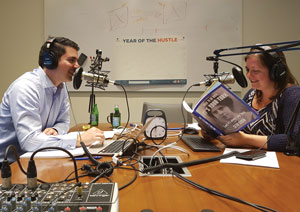 Even for senior lawyers, it’s impossible to overestimate the networking value of running your own podcast. Peter Aprile, the principal at Toronto tax boutique Counter Tax Lawyers, recently realized a longstanding ambition when he and co-host Natalie Worsfold spoke with legendary entrepreneur Seth Godin for their new podcast Building NewLaw, focusing on lawyers and legal technologists who are finding new ways to drag the profession into the future.
Even for senior lawyers, it’s impossible to overestimate the networking value of running your own podcast. Peter Aprile, the principal at Toronto tax boutique Counter Tax Lawyers, recently realized a longstanding ambition when he and co-host Natalie Worsfold spoke with legendary entrepreneur Seth Godin for their new podcast Building NewLaw, focusing on lawyers and legal technologists who are finding new ways to drag the profession into the future.
“We wanted to connect with like-minded people creating interesting legal practices and tools,” Aprile says. “People take it as a compliment when you tell them that you’re interested in what they’re doing and you’d like to talk to them about it.”
The Building NewLaw team doesn’t do things by half, developing a marketing campaign to coincide with the launch of the podcast in the spring and kitting out the boardroom studio with some state-of-the-art equipment. Aprile has already developed an interactive spinoff idea, Ask BNL, where listeners are invited to record their questions and comments for the hosts’ response. Fitting the project around a busy practice can be a challenge, though, and Aprile says he tries not to track just how many hours he has put into the podcast.
“It’s way more work than I expected it to be. My wife asked me recently if I had started another business without telling her. I honestly didn’t mean to, but I’m sure she’ll be a lot happier once all the podcast money starts rolling in,” he jokes. “I’d be lying if I said there weren’t some days when I ask myself if it’s all too much work, but then someone will come up to you at a conference or Tweet to tell you they were listening to an episode and found the solution they were looking for. When you connect people in that way, it gives you the motivation and inspiration to get out there and make another episode.”
And the dedication pays off in the final product, which sounds as slick as any radio show.
“We are not professional podcasters, but we try to bring the same level of quality to our production that we do to our legal work. Everything is vetted to make sure what we’re putting out is of the highest possible quality,” Aprile says. “One thing you have to nail above all is audio quality. Obviously, it’s important that your content is valuable and interesting, but if it the sound quality is poor, nobody is going to hear it because they’re going to switch off.”
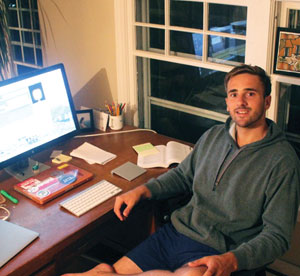 Quality is key, too, for Kyle Ereaux, even though he describes his podcast Sui Generis as a “hobby on the side” of his legal practice at Halifax maritime law specialists Metcalf and Company.
Quality is key, too, for Kyle Ereaux, even though he describes his podcast Sui Generis as a “hobby on the side” of his legal practice at Halifax maritime law specialists Metcalf and Company.
“I just wanted to make something that would try to explain Canadian law in an interesting and relevant way that is tailored to non-lawyers,” Ereaux says.
Inspired by architecture show 99% Invisible, one of the most popular podcasts in the world, Ereaux pays great attention to getting his own atmospheric musical score right, and his words in every show are tightly scripted.
“I want it to be good enough that people will want to listen,” he says. “I had no experience in this area before I started, so I think any lawyer who has an idea for a show could make their own podcast.”
Getting Started in Podcasting
Podcasts have been hailed as a great democratizing force in speech, because they present such a low barrier to entry. How complicated the process gets depends on your own preferences.
Bargain Basement
All you really need to start a podcast is a phone or other device with a voice recording facility.
As for location, any will do. The Docket host Michael Spratt says most of the podcasts are recorded at home, but he has also captured audio out and about at offices in parliament and the Elizabeth Fry Society’s Ottawa headquarters.
“My favourite place to do it is at my mother-in-law’s cottage, with a nice fire going and a view of the lake,” Spratt adds.
Free audio editing software such as Audacity or GarageBand offer intuitive tools and plenty of help for new users.
“I had absolutely no experience. It’s all been YouTube videos and a lot of reading,” says Borderlines host Steve Meurrens, whose level of technical skill before he started podcasting was typical of most lawyer-producers interviewed for this story. “The first time it takes a lot of time, but the second time, it takes half as much, and it continues to get easier after that.”
Even iTunes has a relatively straightforward approval process for podcast, once you’ve registered and hosted your podcast files on a Web site.
Podcast Pro
To take things to the next level, some of our lawyers have invested heavily in equipment. For audiophiles such as Meurrens, a high-quality microphone is a necessity.
“As someone who listens to a lot of podcast material, if it doesn’t sound good, I just turn it off and wait for the next one. Good sound is most important,” he says.
At Counter Tax, where Peter Aprile co-hosts Building NewLaw, he says a sizeable capital investment in microphones and stands, headphones, a mixing desk and “more cables than we know what to do with” has transformed the firm’s boardroom into a professional-looking studio space.
Gold Standard
“I say if you are going to do it, then I recommend you spend a bit of money and do it right,” says Canadian Immigration Podcast host Mark Holthe, who followed his own advice by taking a podcasting training course to hone his broadcasting skills before exposing them to the world on his show.
“I spent hundreds of hours reading, studying and learning to improve. If the quality is not right, people will tune out,” Holthe adds.
Both Holthe and his friendly competitors over at Borderlines have had theme music commissioned for their shows, while the Canadian legal podcasting stalwarts at Hull on Estates have kept up their pioneering spirit by adding a video element to their podcast, and streaming it live over the Internet as well as making it available on iTunes and other podcast providers.
Canadian Legal Podcasts
Blaneys Podcast
Lawyers at Blaney McMurtry LLP, one of Ontario’s largest firms, talk about their own career development and the hottest topics in their practice areas
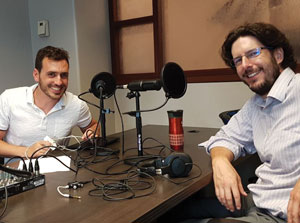 Borderlines
Borderlines
Vancouver lawyers Steven Meurrens and Peter Edelmann bring together lawyers, academics and politicians to discuss Canadian immigration law and policy
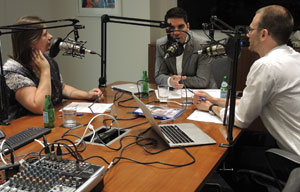 Building NewLaw
Building NewLaw
Hosts Peter Aprile and Natalie Worsfold
interview legal innovators from around the world. Check out episode 7, where Samuel Witherspoon of Miralaw explains how artificial intelligence could transform family law
The Canadian Immigration Podcast
Host Mark Holthe prides himself in getting the type of “insider knowledge” from his guests that you normally only get by hiring them. Check out episode 14 for guest BJ Caruso’s insights on police information sharing at Canadian ports of entry
The Docket
If you haven’t already inhaled Netflix series Making a Murderer, try watching each episode followed by Emilie Taman and Michael Spratt’s entertaining debriefs, with the odd interjection from former Supreme Court Justice Louise Arbour
Hull on Estates
The veterans at Canada’s longest-running legal podcast churn out expert commentary in the estates law field like clockwork. Keep an eye out for the landmark 500th episode, due some time in early 2017
Ideablawg
Join Calgary lawyer Lisa Silver for a section-by-section look at the Criminal Code of Canada and the major cases that have helped shape it
Immigration.ca Podcast
Montreal immigration lawyer Colin Singer keeps prospective immigrants to Canada up to date with the latest news and developments in the field
Investor Lawyer Podcast
Edmonton lawyer Barry McGuire shares the benefit of his more than 40 years in law in this real estate investment show
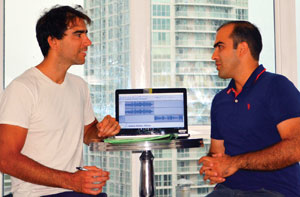 The Law School Show
The Law School Show
Savvy law students go here for on-campus-interview advice from the people who conduct them and former students who survived the process. In Episode 67, podcast co-founders Rishi Dhir and Chris Deschenes also unload priceless insights as part of their post-articling debrief
McGill Law Journal Podcast
Lawyers and faculty tackle a wide range of legal subject matter
on this bilingual podcast
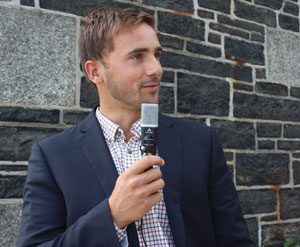 Sui Generis
Sui Generis
Heavy on production values, Kyle Ereaux’s podcast offers
something different from your typical conversational podcast. Try episode 3 to hear the fascinating story of a wartime shipping disaster that changed maritime law forever
Welcome to the Food Court
Glenford Jameson’s food law podcast gives him the chance to “dig deep” with interesting people on subjects that don’t get much attention elsewhere. Episode 3 with seed security expert Aabir Dey had so much good stuff in it, he had to split it into two segments.










